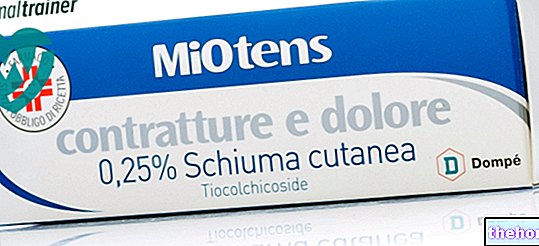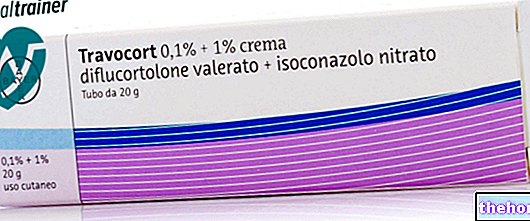Active ingredients: Enterococcus SF68
Bioflorin hard capsules
Why is Bioflorin used? What is it for?
Bioflorin contains the active ingredient enterococcus SF68. This is a microorganism commonly found in the human intestine and is used to treat diarrhea (antidiarrheal microorganism).
This medicine is indicated in all diseases related to an alteration of the intestinal bacterial flora. In particular, Bioflorin is used in the treatment from the initial phase of the following diseases:
- inflammation of the intestine (enteritis) and infectious diarrhea (enterocolitis) of the adult;
- inflammation of the intestine (enteritis) and infectious diarrhea (enterocolitis), severe digestive disorders (toxic dyspepsia) of the child;
- alteration of bacteria normally present in the intestine (intestinal dysmicrobism) of different origins, such as those caused by antibiotics or other medicines and by an unbalanced diet (dietary-nutritional imbalances).
Talk to your doctor if you don't feel better or if you feel worse.
Contraindications When Bioflorin should not be used
Do not take Bioflorin
- if you are allergic to enterococcus SF68 or any of the other ingredients of this medicine (listed in section 6).
Precautions for use What you need to know before taking Bioflorin
Talk to your doctor or pharmacist before taking Bioflorin.
Be especially careful if you are taking antibiotics at the same time (see "Other medicines and Bioflorin").
Interactions Which drugs or foods can modify the effect of Bioflorin
Tell your doctor or pharmacist if you are taking, have recently taken or might take any other medicines.
Bioflorin can interfere with the action of some antibiotics, especially tetracyclines and, to a much lesser extent, with ampicillin, chloramphenicol and cephaloridin.
Warnings It is important to know that:
Pregnancy and breastfeeding
If you are pregnant, think you may be pregnant or are planning to have a baby, or if you are breast-feeding, ask your doctor or pharmacist for advice before taking this medicine, although Bioflorin can usually be taken safely during pregnancy and during pregnancy. lactation period.
Driving and using machines
Bioflorin has no effect on the ability to drive or use machines.
Bioflorin contains lactose
If you have been told by your doctor that you have "sugar intolerance, contact your doctor before taking this medicine.
Dose, Method and Time of Administration How to use Bioflorin: Posology
Always take this medicine exactly as described in this leaflet or as directed by your doctor or pharmacist. If in doubt, consult your doctor or pharmacist.
Do not exceed the indicated doses.
The average recommended dose for adults is: 3 capsules per day
Use in children: 1-2 capsules per day. In children, taking the medicine can be facilitated by dissolving the contents of the capsule in liquids (water, milk, tea, etc.).
In the opinion of the doctor and in relation to the severity of the disease, the doses indicated can also be doubled without any risk of intolerances.
The average duration of treatment is 5-7 days
Overdose What to do if you have taken too much Bioflorin
In case of accidental ingestion / intake of an excessive dose of Bioflorin, notify your doctor immediately or go to the nearest hospital.
There are no known reactions from overdose of the medicinal product.
If you have any further questions on the use of this medicine, ask your doctor or pharmacist.
Side Effects What are the side effects of Bioflorin
Like all medicines, this medicine can cause side effects, although not everybody gets them.
No undesirable effects have ever been reported with the use of Bioflorin.
Reporting of side effects
If you get any side effects, talk to your doctor or pharmacist. This includes any possible side effects not listed in this leaflet. You can also report side effects directly via the national reporting system at https://www.aifa.gov.it/content/segnalazioni-reazioni-avverse
By reporting side effects you can help provide more information on the safety of this medicine.
Expiry and Retention
Keep this medicine out of the sight and reach of children.
Do not use this medicine after the expiry date which is stated on the carton after "EXP". The expiry date refers to the last day of that month. The expiry date refers to the intact product correctly stored.
Store below 25 ° C.
Do not throw any medicines via wastewater or household waste. Ask your pharmacist how to throw away medicines you no longer use. This will help protect the environment.
What Bioflorin contains
- The active ingredient is: enterococci of the L.A.B. (Lactic Acid Bacteria) strain SF68 freeze-dried. One hard capsule contains no less than 75 million enterococci.
- The other ingredients are: lactose, magnesium stearate, precipitated silica.
Description of what Bioflorin looks like and contents of the pack
Box of 25 hard capsules.
Source Package Leaflet: AIFA (Italian Medicines Agency). Content published in January 2016. The information present may not be up-to-date.
To have access to the most up-to-date version, it is advisable to access the AIFA (Italian Medicines Agency) website. Disclaimer and useful information.
01.0 NAME OF THE MEDICINAL PRODUCT
BIOFLORIN HARD CAPSULES
02.0 QUALITATIVE AND QUANTITATIVE COMPOSITION
Each hard capsule contains:
Active principle: enterococci of the type L.A.B. ("Lactic Acid Bacteria") strain SF68 lyophilized, not less than 75 million.
Excipients: lactose
For the full list of excipients see section 6.1.
03.0 PHARMACEUTICAL FORM
Hard gelatin capsules for oral use.
04.0 CLINICAL INFORMATION
04.1 Therapeutic indications
Bioflorin is of considerable utility for the correction of alterations of the intestinal microflora due to various causes of a dietary-nutritional, toxic, environmental, climatic, etc ...
Bioflorin is indicated in all clinical conditions in which an alteration of the intestinal microflora plays a decisive role. In particular, it can represent the treatment right from the onset of:
• enteritis and infectious diarrhea in general such as:
enterocolitis of the adult;
enteritis, enterocolitis, toxic dyspepsia of the child.
• Intestinal dysmicrobisms of different origins, such as those caused by antibiotics or other drugs and dietary-nutritional imbalances and dependent clinical pictures.
04.2 Posology and method of administration
The average dosage is 3 capsules per day in adults and 1-2 capsules per day in children; in the latter the intake can be facilitated by dispersing the contents of the capsule in liquids (water, milk, tea, etc ... ). In the opinion of the doctor, in relation to the severity of the clinical form, the indicated doses can also be doubled without any risk of intolerances. The average duration of treatment is 5-7 days.
04.3 Contraindications
No contraindications to the treatment are known so far, except for states of known hypersensitivity to the active substance or to any of the excipients.
04.4 Special warnings and appropriate precautions for use
Avoid concomitant use with antibiotics to which enterococcus strain SF68 is sensitive.
The capsules contain lactose therefore Patients with rare hereditary problems of galactose intolerance, lactase deficiency, or glucose-galactose malabsorption should not take this medicine.
04.5 Interactions with other medicinal products and other forms of interaction
The active ingredient of BIOFLORIN is sensitive to the action of certain antibiotics, especially tetracyclines and, to a much lesser extent, to ampicillin, chloramphenicol and cephaloridine.
04.6 Pregnancy and lactation
The preparation can be used without problems both during pregnancy and breastfeeding.
04.7 Effects on ability to drive and use machines
BIOFLORIN has no effect on the ability to drive or use machines.
04.8 Undesirable effects
No secondary effects following treatment have been reported to date.
04.9 Overdose
There are no known reactions to overdose of the product.
05.0 PHARMACOLOGICAL PROPERTIES
05.1 Pharmacodynamic properties
Pharmacotherapeutic group: antidiarrheal microorganisms.
ATC code: A07FA01.
BIOFLORIN consists of a very pure culture in lyophilized form of Enterococci type L.A.B. (Lactic Acid Bacteria) strain SF68. Enterococcus strain SF68 is indifferent to a wide range of antibiotics, it is resistant to various chemical-physical agents and, in particular, to low pH values; it is endowed with a "high replication speed (doubling of the colonies every 19 min. ). SF68 produces lactic acid and inhibits the growth of various enteropathogens through environmental acidification mechanisms, biological competition at the luminal and wall level and the production of biologically active substances. Enterococcus strain SF68 is able to overcome the gastric barrier after oral administration and to rapidly colonize the human intestine both at the level of the ileum and, above all, at the level of the colon; it is excreted with the faeces. Normally it persists in the "human intestine and faeces even for a few days after the suspension of oral administrations. Finally, BIOFLORIN is characterized by a particularly high clinical tolerability and by the lack of toxicity. SF68 is not an invasive germ and belongs to a genus which is a normal constituent of the intestinal microflora of man; as such it appears devoid of pathogenic properties as shown also by the experimental documentation on the product.
05.2 "Pharmacokinetic properties
05.3 Preclinical safety data
06.0 PHARMACEUTICAL INFORMATION
06.1 Excipients
Lactose, magnesium stearate, precipitated silica.
06.2 Incompatibility
The pharmaceutical form excludes the presence of incompatibility.
06.3 Period of validity
18 months.
06.4 Special precautions for storage
Store below 25 ° C. The expiry date indicated refers to the product in intact and correctly stored packaging.
06.5 Nature of the immediate packaging and contents of the package
Glass bottle with plastic safety closure. Bottle of 25 hard capsules.
06.6 Instructions for use and handling
No special instructions
07.0 MARKETING AUTHORIZATION HOLDER
Sanofi-aventis S.p.A. - Viale L. Bodio, 37 / B - Milan
08.0 MARKETING AUTHORIZATION NUMBER
BIOFLORIN hard capsules A.I.C. n. 024274019
09.0 DATE OF FIRST AUTHORIZATION OR RENEWAL OF THE AUTHORIZATION
Renewal: 01.06.2010
10.0 DATE OF REVISION OF THE TEXT
DECEMBER 2011




























